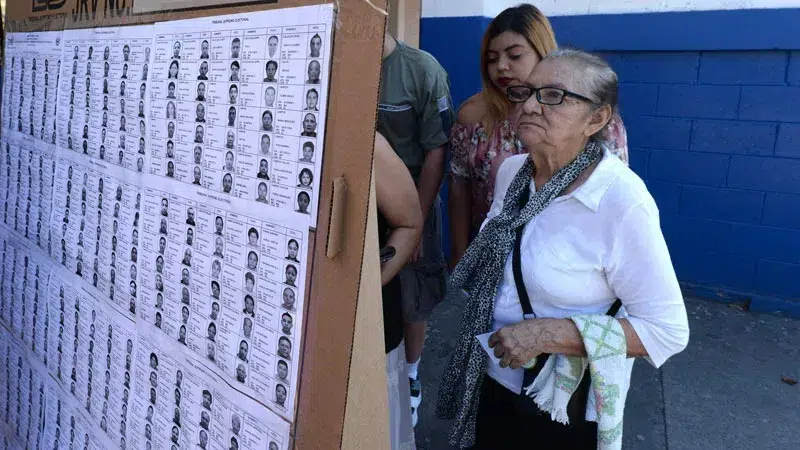The fact that there will be no registration for the exercise of the overseas vote in the 2024 elections will generate several problems for the Supreme Electoral Tribunal (TSE) because the actual universe of voters will not be known, and this could affect the integrity of the electoral process.
This was affirmed by three experts consulted by El Diario de Hoy after pro-government deputies assured that registration would not be necessary after the approval of the Special Law for the Suffrage Abroad.
The expert in electoral law, Ruth Eleonora López, responded to this publication and stated that the registration “is not an obstacle and was done through the Internet. Was it agile? No. Could it be improved? Yes. Was it necessary? Yes, very much so.
In declarations to this media, Lopez explained that the electoral roll is an ordered list of voters and reminded that in the case of voters abroad, these are divided into two groups: those who have a Unique Identity Document (DUI) with an address abroad who will vote by the Internet and those who have a DUI with an address in the country or a passport who will vote in person.
The expert pointed out that the lack of communication with these possible voters (with DUI or passport) is a severe flaw in the process because it prevents the TSE, for example, from knowing what the expectation of voters, which means that it will not know how many JRVEX (Juntas Receptoras de Votos Desde El Exterior) it will have to install, how many machines it will need for the voting center or the necessary capacity for each center and even prevents it from coordinating with the security of the countries where voting will take place is.
The executive director of Acción Ciudadana, Eduardo Escobar, did not favor this decision to skip registration for Salvadorans residing outside the country.
This expert in electoral law recalled that last June, reforms to the Law of the National Registry of Natural Persons (RNPN) were approved with which political parties can no longer verify the electoral registry.
“If we add this reform to the RNPN to the fact that they are no longer going to register, a complicated situation may arise of not having certainty in the reality of who is qualified to vote, how many there are, and it could also give way to people who are not in the electoral registry or who are not qualified to vote, to vote” in the 2024 elections, warned Escobar.
TSE no sabrá cuántos pueden votar y crece riesgo de fraude al no requerir empadronamiento a diáspora
El que no haya empadronamiento para el ejercicio del voto exterior de las elecciones del 2024 generará varios problemas para el Tribunal Supremo Electoral (TSE) debido a que no se conocerá el universo real de votantes y con eso se podría afectar la integridad del proceso electoral.
Así lo afirmaron tres expertos consultados por El Diario de Hoy, luego de que diputados oficialistas aseguraran que no será necesario el empadronamiento tras aprobarse la Ley Especial para el Sufragio en El Exterior.
La experta en derecho electoral, Ruth Eleonora López, respondió a esta publicación y manifestó que el empadronamiento “no es obstáculo y se hacía por internet. ¿Era ágil? No. ¿Era mejorable? Sí. ¿Era necesario? Sí y mucho”.
En declaraciones a este medio, López explicó que el padrón electoral es un listado ordenado de electores y recordó que en el caso del exterior estos se dividen en dos grupos: los que tienen Documento Único de Identidad (DUI) con dirección en el exterior que votarán por internet y los que tienen DUI con dirección en el país o pasaporte que votarán de forma presencial.
La experta señaló que la falta de una comunicación con estos posibles electores (con DUI o pasaporte) es una falencia grave para el proceso porque le impide al TSE, por ejemplo, saber cuál es la expectativa de votantes, lo que implica que no sabrá cuántas Juntas Receptoras de Votos desde El Exterior ( JRVEX) deberá instalar, cuántas máquinas necesitará para el centro de votación o la capacidad necesaria para cada centro e incluso le impide coordinar con la seguridad de los países donde se vota.
El director ejecutivo de Acción Ciudadana, Eduardo Escobar, no se mostró a favor de esta decisión de saltarse el empadronamiento para los salvadoreños residentes fuera del país.
Este experto en derecho electoral recordó que en junio pasado se aprobaron reformas a la Ley del Registro Nacional de las Personas Naturales (RNPN) con las cuales los partidos políticos ya no pueden verificar el registro electoral.
“Si sumamos esa reforma al RNPN al hecho de que ya no se van a empadronar puede darse una situación complicada de no tener certeza en realidad de quiénes están habilitados para votar, cuántos son y además podría dar paso a que personas que no están en el registro electoral o que no están habilitadas para votar, voten” en las elecciones del 2024, advirtió Escobar.

